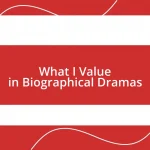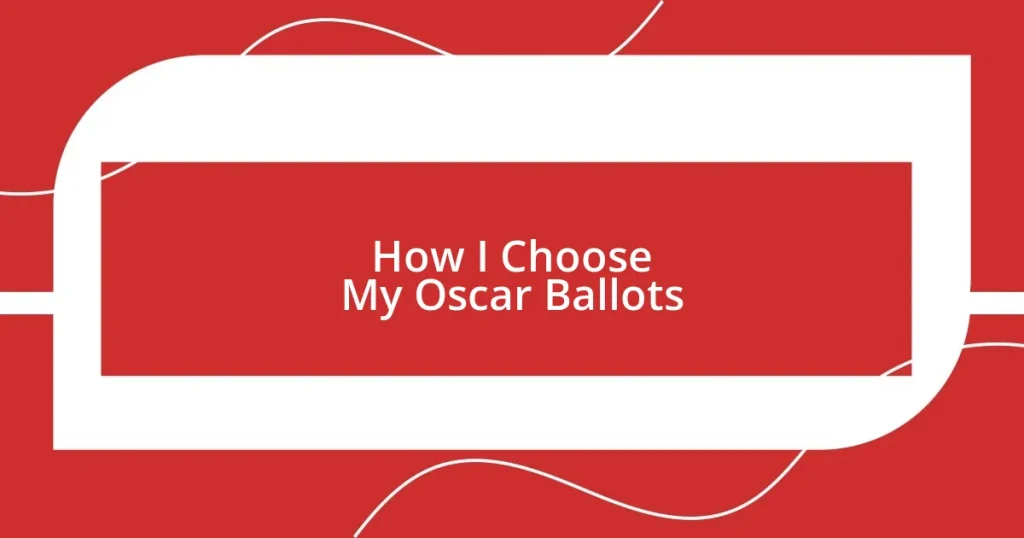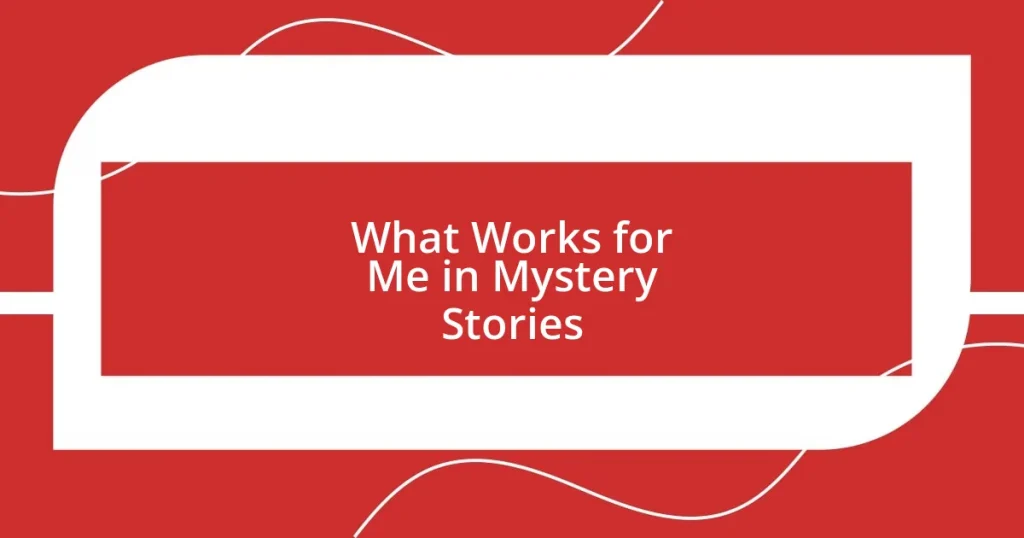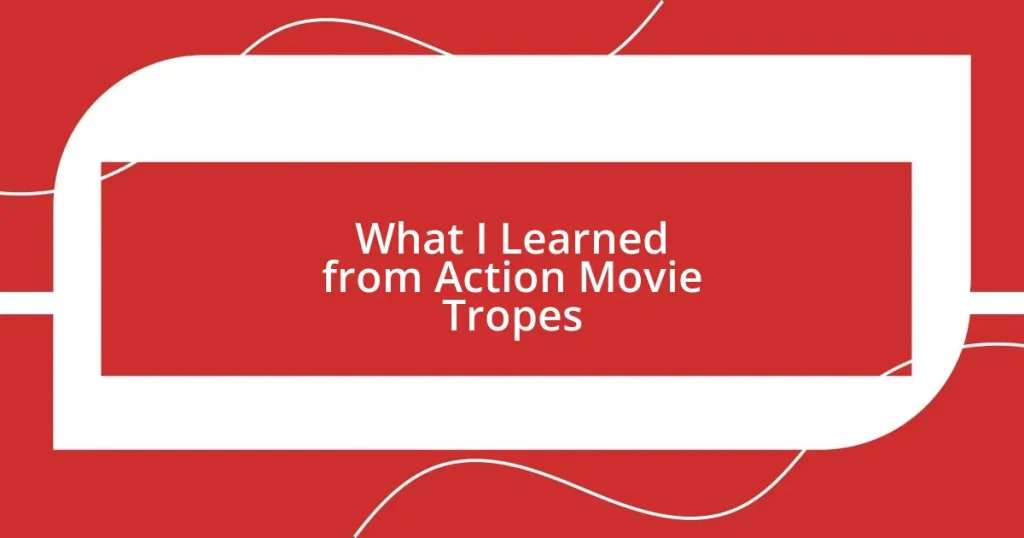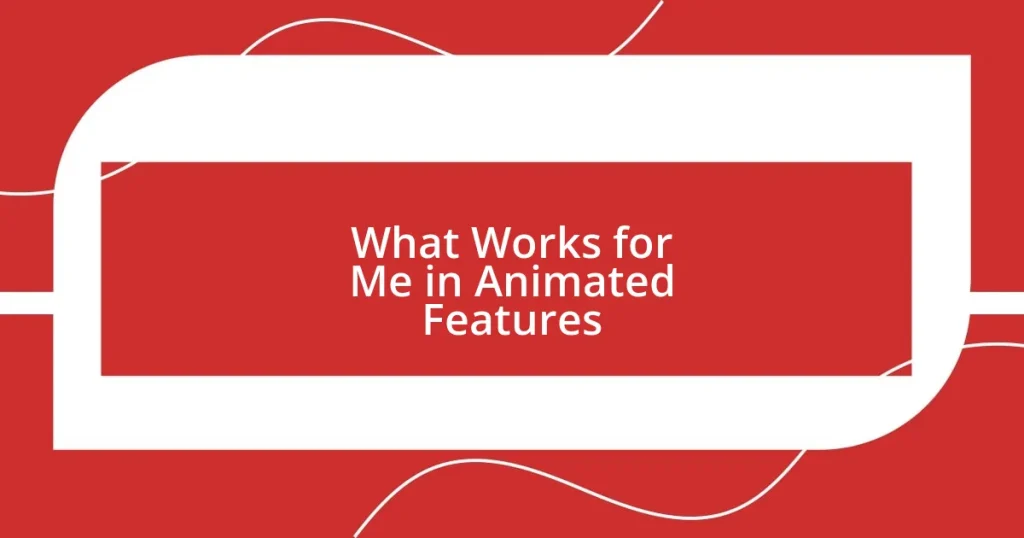Key takeaways:
- The Oscar voting process involves members voting within their branches for nominees, while all members vote for winners, reflecting diverse perspectives on cinema.
- Thorough research on films, including watching them and reading reviews, enhances appreciation for the artistry and informs ballot choices.
- Analyzing past Oscar trends helps identify patterns in winners, such as the significance of social issues and established actors in influencing votes.
- Engaging with expert opinions and film review resources enriches understanding and connects personal insights with broader community discussions around cinema.
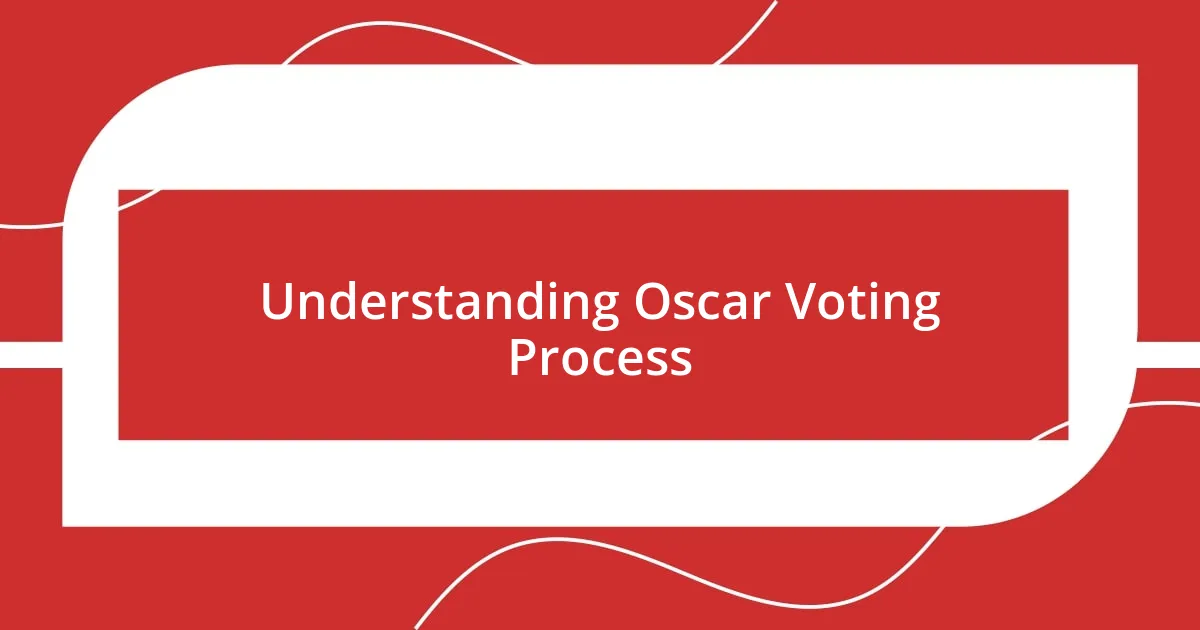
Understanding Oscar Voting Process
The Oscar voting process is quite fascinating, isn’t it? Members of the Academy, which consists of thousands of industry professionals, collectively nominate and vote on films and performances. I’ve always found it intriguing how this complex process leads to the celebration of art that resonates deeply with so many of us.
When I learned that the voting is done in rounds—first for nominations and then for winners—I felt a deeper appreciation for how these decisions are made. Can you imagine the discussions that take place? It’s not just a tally of votes; it’s a reflection of artistry, passion, and sometimes even heated debates amongst peers who care deeply about cinema.
What strikes me most is how members can only vote within their own branches for the nominees, yet everyone votes for the final winners. This structure makes me ponder how different perspectives shape our understanding of what makes a film or performance truly exceptional. Knowing that industry experts are evaluating each piece through their unique lenses adds layers to the experience as I fill out my own ballot.
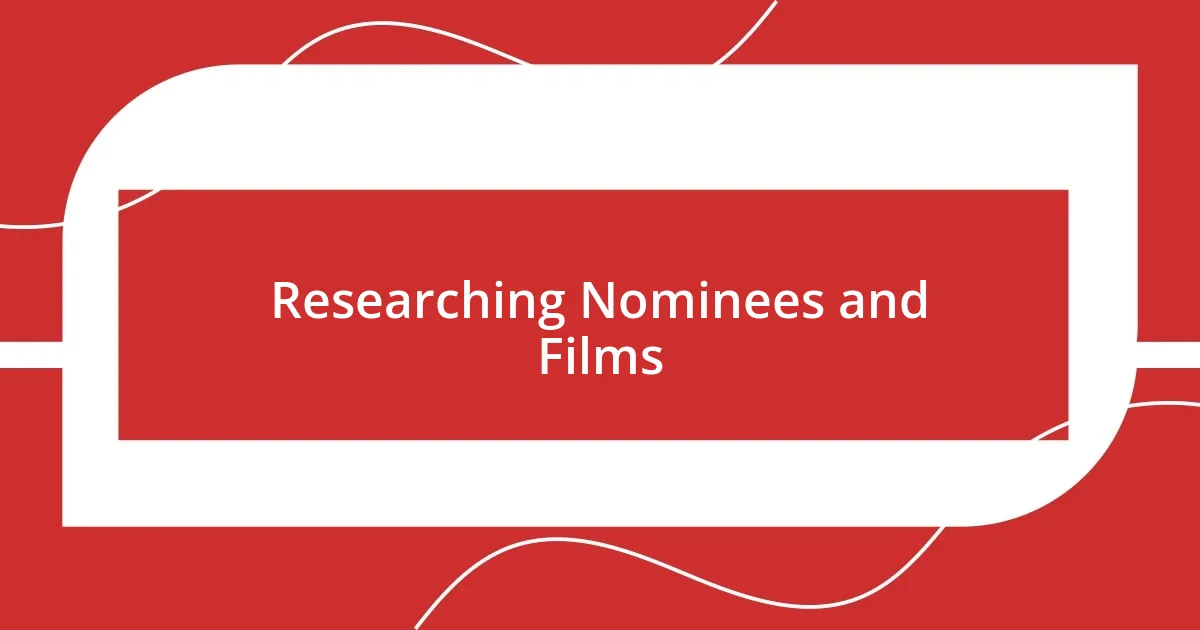
Researching Nominees and Films
Researching the nominees and their films is a key part of my Oscar ballot preparation. I like to immerse myself in the cinematic world by watching the films and reading about their production backgrounds. It sparks my passion for film and allows me to appreciate the artistry involved. There’s something satisfying about digging into interviews with directors and actors, or watching behind-the-scenes footage that uncovers the effort behind what I see on screen.
Here are some specific actions I take when researching nominees:
- Watch the films: I try to see all the films, as firsthand experience is invaluable.
- Read reviews and critiques: Understanding critical perspectives can shed light on performances and narratives.
- Explore production stories: Learning about the filmmaking process enriches my appreciation.
- Check out interviews: Hearing firsthand accounts from actors and directors adds depth to their performances.
- Look for industry buzz: Following awards seasons and industry news provides context to the nominations.
I remember one year, I was so moved by a smaller film that flew under the radar but packed an emotional punch. The backstory behind its creation made me root for it all the more. I think these layers of exploration really help cultivate my choices, turning my ballot into a reflection of what I find truly impactful in cinema.

Analyzing Past Winner Trends
When I look at past Oscar winners, patterns often emerge that can inform my choices for the current year. For instance, films that showcase strong performances from established actors tend to rise to the top. I remember noticing how certain directors consistently get recognition, which makes me ponder if their unique storytelling vision creates a recipe for success. Also, I like to analyze whether the same genres or themes recur in the winners, as this sometimes foreshadows what the Academy may favor in upcoming ceremonies.
Digging into trends also allows me to reflect on the cultural shifts surrounding the Oscars. Films that resonate with contemporary issues—like social justice or mental health—frequently gain traction. It was fascinating to see how a film I loved last year, which addressed the complexities of identity, soared to multiple awards. Watching how societal dialogues influence winners adds an enriching layer to my ballot process.
The history of the Academy Awards reveals fascinating trends as well, particularly regarding the types of films that receive the Best Picture accolade. Over the decades, we’ve seen a mix of grand historical dramas, light-hearted comedies, and poignant indie films capturing that top prize. I often wonder, why do certain years favor particular styles? For example, after a string of epic spectacles, a quieter, character-driven story might stand out and resonate with voters. My personal insights into these fluctuations help shape my ballot choices.
| Year | Best Picture Winner |
|---|---|
| 2022 | CODA |
| 2021 | Nomadland |
| 2020 | Parasite |

Seeking Expert Opinions
Seeking expert opinions is another fundamental aspect of my Oscar ballot process. Engaging with film critics and industry insiders gives me a unique perspective that enriches my choices. I often find myself turning to podcasts or YouTube channels where experts dissect performances and filmmaking styles. Their enthusiasm is contagious, and I can’t help but feel more informed after hearing their insights.
I remember tuning into a round-table discussion just before the nominations were announced. One critic passionately argued for an underdog film, highlighting its emotional depth and innovative storytelling. It was a revelation! I went from being indifferent to genuinely rooting for that film, which made me realize how powerful expert opinions can be in shaping my understanding of cinema.
Moreover, I also tap into social media, where discussions can spark new ideas. Platforms like Twitter often buzz with real-time reactions and analyses from film enthusiasts and professionals alike. Do they sway my opinions? Absolutely! For instance, after delving into a debate about a controversial performance, I reconsidered my stance. I value how these community insights challenge my perceptions and encourage me to think critically about my selections.
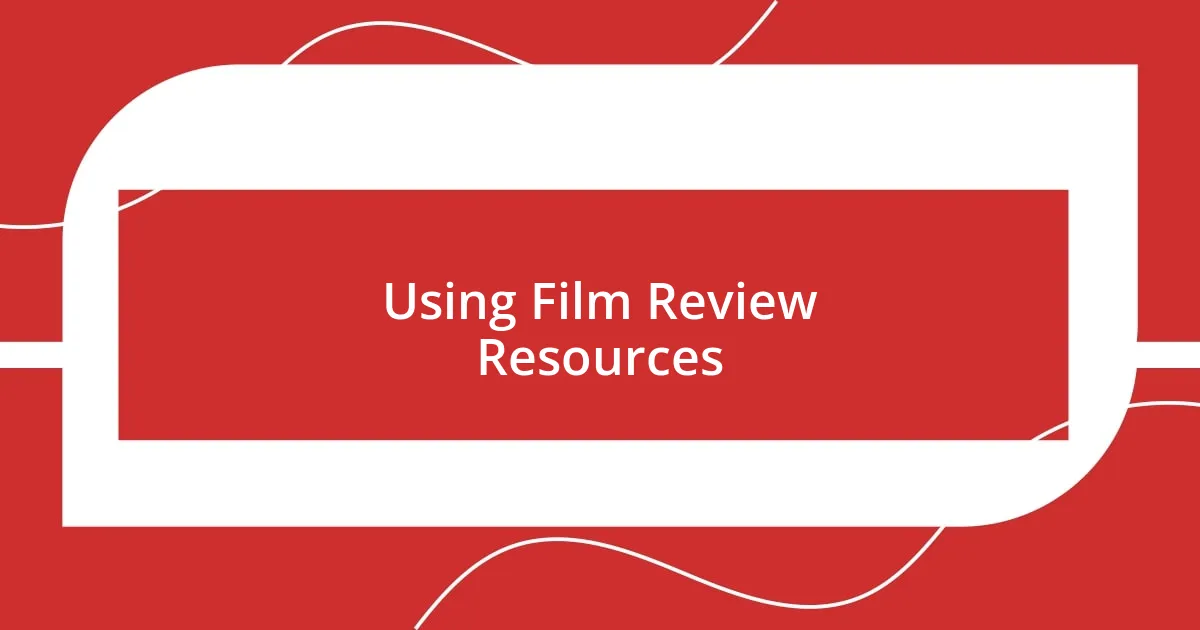
Using Film Review Resources
Using film review resources helps deepen my understanding of what makes a film Oscar-worthy. I lean heavily on reputable sources like Rotten Tomatoes and Metacritic to gauge critical responses. Their aggregate scores often provide a quick snapshot of how films resonate with audiences and critics alike. Have you ever looked at a movie’s score and changed your mind about watching it? I definitely have. A film I was hesitant about once received rave reviews, prompting me to give it a chance, and it ended up being one of my favorites of the year!
Diving into detailed reviews often uncovers layers I might have missed. There’s this one film that seemed straightforward at first glance, but a thoughtful review revealed its subtle commentary on family dynamics. That’s when I thought, “Wow, I need to revisit that with a fresh perspective.” These reviews can illuminate aspects of cinematography or writing that I hadn’t considered, enriching my experience and guiding my ballot choices.
I also enjoy utilizing online film communities and critics’ blogs where passionate fans share their insights. I remember one discussion about a film’s soundtrack that transformed my entire appreciation for it. It was fascinating to see how specific music choices underscored the emotional weight of a scene. Engaging with these resources gives me a sense of connection to a larger community of film lovers. It’s almost like being part of a secret club where we dissect and debate our favorites before the big night!

Making Final Selections
Making those final selections is always the most thrilling part of filling out my Oscar ballot. I often find myself wrestling with my instincts and the overwhelming amount of information I’ve gathered. Sometimes, I’ll sit down with my list and just feel conflicted about a certain category. Have you ever experienced that sense of doubt about your choices? Last year, I was torn between two leading performances. After a heartfelt rewatch of both films, I let my emotions guide me—because at its core, isn’t cinema meant to move us?
To bring clarity to my final votes, I revisit my initial impressions of each nominee. I often take notes while watching during the awards season, jotting down moments that struck a chord with me. One nomination I scrutinized was for Best Director. I remembered being captivated by how one filmmaker intricately wove together various storylines. Reliving that experience helped cement my choice, reminding me that the vision behind a film shapes its overall impact.
In some cases, I lean on gut feelings developed from my personal connections with the films. For instance, there was a particular animated film that brought tears to my eyes. I couldn’t shake the sentiment it evoked when reflecting on my childhood and family. It reminded me that, sometimes, it’s those subjective moments that should guide our choices—definitely a powerful reminder that the Oscars are ultimately about celebrating the artistry that resonates with us on a personal level.
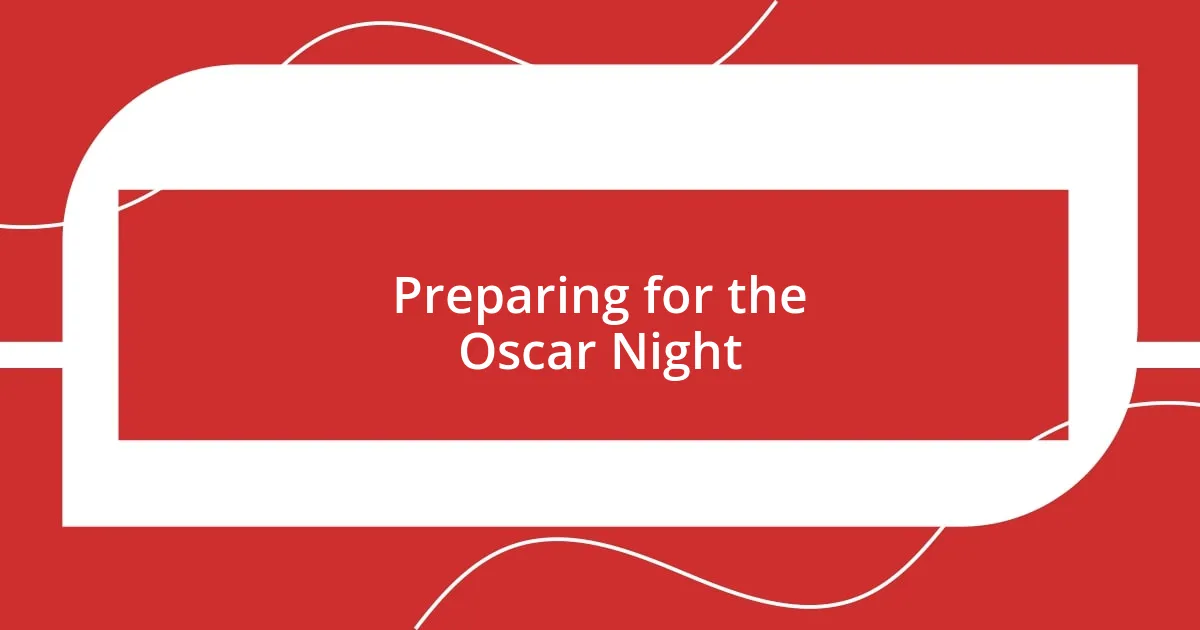
Preparing for the Oscar Night
As Oscar night approaches, I find myself eagerly organizing my viewing schedule. I block off my calendar to ensure I catch up on all the nominees, sometimes even scheduling movie marathons! There’s something magical about binge-watching these films with a sense of purpose. Have you ever felt that thrill of anticipation when diving into a series of films? It’s like embarking on a cinematic adventure that heightens my appreciation for the artistry leading up to the big night.
I always make it a point to chat with friends and fellow movie lovers during this prep phase. I remember a conversation about a lesser-known indie film that unexpectedly stole the show for us. We debated its themes and artistic choices for hours. Sharing insights with others not only enriches my perspective but also sparks fresh ideas that I may not have considered. It’s fascinating how these discussions can shift my views and influence my ballot choices, making Oscar night feel like a community celebration.
Lastly, I jot down my thoughts and feelings after each film to capture my emotional responses. This practice allows me to reference my initial impressions later, which can be vital when comparing performances or directorial styles. For example, after watching a gripping documentary, I found myself reflecting deeply on its social implications. Those raw, unfiltered emotions play a crucial role in my selections. Have you noticed how some films linger in your mind long after they end? I believe it’s those lasting impressions that often guide me to make the best choices when filling out my ballot.




